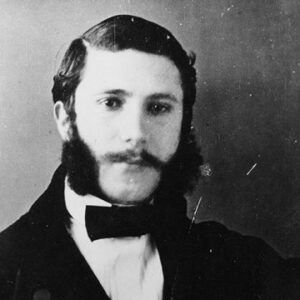Henry Dunant, also known as Jean Henri Dunant, was a Swiss social and peace activist who co-founded the Red Cross and shared the first Nobel Peace Prize with French peacemaker Frederic Passy. Durant’s life was the polar opposite of the rags to riches narrative. His life began in a noble mansion and ended in a small village hospice. It spanned the acclaim of founding international organizations dedicated to the care of soldiers wounded in battle to the obscurity of being shunned by all. He remained in the hospice in the remote village for many years before being rediscovered and showered with honors. Although he was born with a silver spoon, he died as a pauper. He invested in a business but lost it all when he became preoccupied with humanitarian work. He was forced to eat crumbs of bread and sleep on the streets when he ran out of money. He left the remainder of his estate to his relatives and charitable organizations after paying off his debts. Additionally, some of this money was used to reserve a free bed for poor patients at the hospice where he died.
Childhood & Adolescence
Jean Henri Dunant was born in Geneva, Switzerland, on May 8, 1828, to Jean-Jaques Dunant, a prosperous businessman, and Antoinette Dunant-Colladon, a social activist.
At the age of 18, he began his social work by founding the ‘Thursday Association.’ When he was 21, Henry Dunant was forced to leave College Calvin due to his failing grades.
Career of Henry
As an apprentice, he joined the banking firm ‘Lullin et Sautter’ in 1849. In 1856, he founded the multinational ‘Financial and Industrial Company of Mons-Djemila Mills’ and purchased land in Algeria for corn cultivation.
On June 24, 1859, he arrived in the town of Solferino, Lombardy, Northern Italy, to bring to Napoleon III’s attention the uncooperative attitude of local Algerian authorities.
He came face to face with a battle between Napoleon III’s French-Sardinian forces and Austrian troops, which resulted in the death, death, or injury of over 40,000 troops, and was moved by their anguish.
He arranged for medical assistance and food, organized civilian nursing, and negotiated the release of Austrian doctors held captive to assist wounded soldiers of all nationalities.
On February 9, 1863, the ‘Geneva Society for Public Welfare,’ led by Swiss lawyer Gustave Moynier, established a five-member committee to discuss his ideas for assisting wounded soldiers.
The ‘International Red Cross’ society was founded on February 17, 1863, during the committee’s first meeting, despite disagreements over the society’s neutrality.
In October 1863, 14 nations decided to establish an organization to care for soldiers wounded in battle under the leadership of Dunant and Moynier.
On August 22, 1864, the ‘Geneva Convention’ was signed by 12 nations. Dunant departed Geneva in March 1867, never to return.
Dunant was forced to declare bankruptcy in April 1867 when his business failed. On August 25, 1868, he was expelled from the International Committee and demoted to the position of Secretary. He was also kicked out of the YMCA.
Durant was convicted of business malpractice by the ‘Geneva Trade Court’ on August 17, 1868. Between 1870 and 1871, he founded the ‘Common Relief Society’ to aid soldiers wounded in battle.
Dunant lived in abject poverty from 1874 to 1886, residing in the cities of Rome, Basel, Corfu, Karlsruhe, and Stuttgart.
In July 1887, he relocated to Heiden, a small Swiss village he had visited in 1881 with some Stuttgart friends.
In 1890, he was appointed honorary president of the Red Cross’s temporary Heiden chapter, which Susanna Sonderegger, the wife of a teacher named Wilhelm Sonderegger, founded.
On April 30, 1892, he became gravely ill and sought refuge in a Heiden hospice, where he remained until his death.
Georg Baumberger, editor-in-chief of ‘St. Gall,’ met him in Heiden and published his contributions to the International Red Cross Society’s formation in 1895. This was confirmed in 1897 in a book written by Rudolf Muller, a teacher Durant met in Stuttgart.
After returning from a trip to Tunisia, Sicily, and Algeria in 1853, Jean Henri Dunant wrote his first book, ‘An account of the regency in Tunis,’ which was published in 1858 and included a chapter on slavery.
In 1859, he completed his second book, ‘A Memory of Solferino,’ which was published in 1862. The book detailed the battle, the cost in human lives, and the subsequent chaos.
Awards and Accomplishments
Georg Baumberger’s article aided him in winning the 1895 Swiss Binet-Fendt Prize. Additionally, Pope Leo XIII sent him a note of appreciation.
Rudolf Muller’s book helped him and French pacifist Frederic Passy win the first Nobel Peace Prize in 1901.
Personal History and Legacies
On October 30, 1910, Jean Henri Dunant died in the Heiden hospice in Switzerland. He was survived by a daughter from his previous marriage.
He had battled depression and paranoia throughout his years in Heiden. Every year, on May 8, his birthday is observed as ‘World Red Cross Day.’
The former hospice has been renamed the ‘Henry Dunant museum.’ Numerous streets and roads throughout the world, including Geneva, are named after him.
Humanitarian Action of Henry
His campaign to aid wounded soldiers in battle and his work in establishing the ‘Red Cross’ are widely regarded as the nineteenth century’s crowning achievements.
Estimated Net Worth
The net worth of Henry is $1.2million.
Trivia
Though Jean Henri Durant was a Calvinist in his youth, he later converted to agnosticism.


